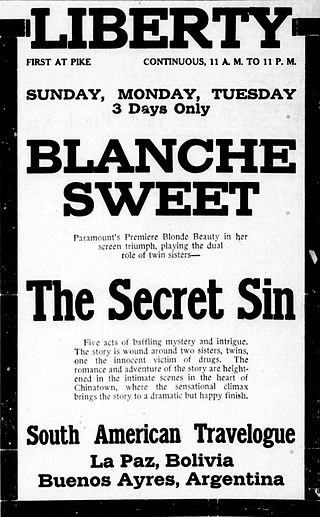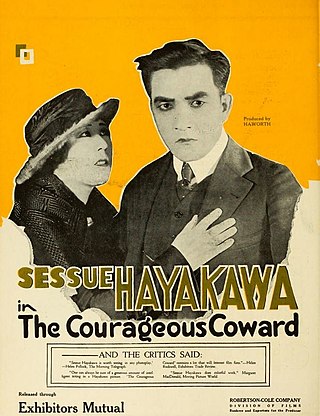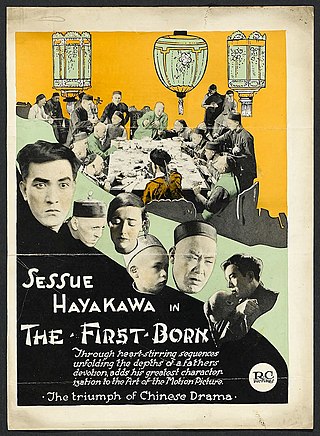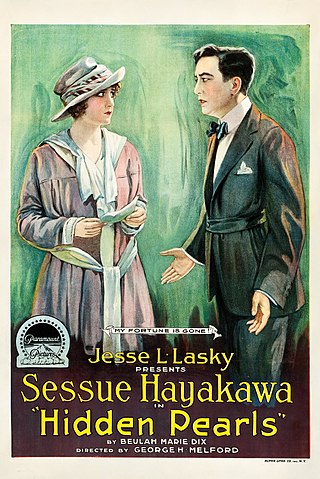
Hell to Eternity is a 1960 American World War II film starring Jeffrey Hunter, David Janssen, Vic Damone and Patricia Owens, directed by Phil Karlson. This film biopic is about the true experiences of Marine hero Pfc. Guy Gabaldon, a Los Angeles Hispanic boy raised in the 1930s by a Japanese American foster family, and his heroic actions during the Battle of Saipan. Sessue Hayakawa played the role of Japanese commander at Saipan.

The Dragon Painter is a 1919 English language silent romance drama film. It is based on the novel of the same name, written by Mary McNeil Fenollosa. It stars Sessue Hayakawa as a young painter who believes that his fiancée, is a princess who has been captured and turned into a dragon. It was directed by William Worthington and filmed in Yosemite Valley, Yosemite National Park, and in the Japanese Tea Garden in Coronado, California.

The Devil's Claim is a 1920 American silent drama film starring Sessue Hayakawa and Colleen Moore. A print of this film survives.

The Swamp is a 1921 American silent drama film released by the Robertson-Cole Pictures Corporation and directed by Colin Campbell. The film was written and produced by Sessue Hayakawa, who also co-stars with Bessie Love. A print of this film is preserved at the Gosfilmofond archive in Moscow.

The Vermilion Pencil is a 1922 American silent drama film directed by Norman Dawn, and produced and distributed by Robertson–Cole. It is based on the eponymous 1908 novel by Homer Lea. The film stars Japanese actor Sessue Hayakawa in multiple roles, and white actors Ann May, Bessie Love, and Sidney Franklin, all in Asian roles. It is now a lost film.

Walter Stradling was an English-born American cinematographer of the silent era. He is best remembered for working on several well-known feature films of Mary Pickford and for the Famous Players–Lasky production company in general. He also worked on the films of Cecil B. DeMille, Sessue Hayakawa and Blanche Sweet. Stradling died relatively young at 43 in the 1918 flu pandemic. He was the uncle of the cinematographer Harry Stradling.

The Secret Sin is a surviving 1915 silent film drama produced by Jesse Lasky and distributed by Paramount Pictures. It was directed by Frank Reicher and starred Blanche Sweet, Thomas Meighan and Sessue Hayakawa. This film often thought lost actually survives at the Library of Congress and along with a few other surviving Lasky features from 1915-17 allows viewing of Blanche Sweet during her Paramount period immediately after she left D. W. Griffith's employ. In this film Sweet has a rare chance to act in a double exposure scene playing two different characters.

The Soul of Kura San is a lost 1916 American drama silent film directed by Edward LeSaint and written by Charles Sarver. The film stars Sessue Hayakawa, Myrtle Stedman, Tsuru Aoki, George Webb, Kisaburo Kurihara and George Kuwa. The film was released on October 30, 1916, by Paramount Pictures.
The Victoria Cross is a surviving 1916 American drama silent film directed by Edward LeSaint and written by Paul M. Potter and Margaret Turnbull. The film stars Lou Tellegen, Cleo Ridgely, Sessue Hayakawa, Ernest Joy, Mabel Van Buren and Frank Lanning. The film was released on December 14, 1916, by Paramount Pictures.
Each to His Kind is a lost 1917 American drama silent film directed by Edward LeSaint and written by George DuBois Proctor and Paul West. The film stars Sessue Hayakawa, Tsuru Aoki, Vola Vale, Ernest Joy, Eugene Pallette and Guy Oliver. The film was released on February 5, 1917, by Paramount Pictures.

The Courageous Coward is a 1919 American silent drama film directed by William Worthington and featuring Sessue Hayakawa and Tsuru Aoki in lead roles. It is presumed to be a lost film, with only reel 5 preserved at the EYE Film Institute Netherlands film archive.

The Temple of Dusk is a lost 1918 American silent drama film directed by James Young. It was produced by Sessue Hayakawa's Haworth Pictures Corporation.

The Man Beneath is a 1919 American silent crime drama film directed by William Worthington and produced by Sessue Hayakawa's Haworth Pictures Corporation. A complete copy of the film is in the collection of the EYE Film Institute Netherlands.

The Illustrious Prince is a 1919 American drama film directed by William Worthington and produced by Sessue Hayakawa's Haworth Pictures Corporation.

The Tong Man is a 1919 American thriller film directed by William Worthington and produced by Haworth Pictures Corporation.

The Beggar Prince is a lost 1920 film directed by William Worthington and produced by Sessue Hayakawa's Haworth Pictures Corporation.

An Arabian Knight is a 1920 American drama film directed by Charles Swickard and produced by Sessue Hayakawa's Haworth Pictures Corporation. Its survival status is classified as unknown, which suggests that it is a lost film. Nevertheless, the Library of Congress lists this as being in their collection.

The First Born is a 1921 American silent film romantic drama directed by Colin Campbell and produced by and starring Sessue Hayakawa. It was distributed by the Robertson-Cole Company.

The City of Dim Faces is a lost 1918 silent film directed by George Melford and starring Sessue Hayakawa. It was produced by Famous Players–Lasky and distributed by Paramount Pictures.

The Hidden Pearls is a surviving 1918 American silent drama film directed by George Melford and starring Sessue Hayakawa. It was produced by Adolph Zukor and Jesse Lasky and distributed by Famous Players–Lasky and Paramount Pictures. The production was shot in Hawaii.




















